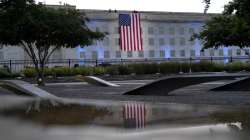FBI releases newly declassified record on September 11 attacks
The heavily redacted record released Saturday describes a 2015 interview with a person who was applying for US citizenship and years earlier had repeated contacts with Saudi nationals who investigators said provided “significant logistical support” to several of the hijackers.

The FBI late Saturday released a newly declassified 16-page document related to logistical support provided to two of the Saudi hijackers in the run-up to the Sept. 11, 2001, terrorist attacks. The document describes contacts the hijackers had with Saudi associates in the U.S. but offers no evidence the Saudi government was complicit in the plot.
The document, released on the 20th anniversary of the attacks, is the first investigative record to be disclosed since President Joe Biden ordered a declassification review of materials that for years have remained out of public view. Biden had encountered pressure in recent weeks from victims’ families, who have long sought the records as they pursue a lawsuit in New York alleging that senior Saudi officials were complicit in the attacks.
The Saudi government has long denied any involvement. The Saudi Embassy in Washington said Wednesday that it supported the full declassification of all records as a way to “end the baseless allegations against the Kingdom once and for all.” The embassy said that any allegation that Saudi Arabia was complicit was “categorically false.”
Biden last week ordered the Justice Department and other agencies to conduct a declassification review of investigative documents and release what they can over the next six months. The 16 pages were released on Saturday night, hours after Biden attended Sept. 11 memorial events in New York, Pennsylvania and northern Virginia. Victims’ relatives had earlier objected to Biden’s presence at ceremonial events as long as the documents remained classified.
The heavily redacted record released Saturday describes a 2015 interview with a person who was applying for U.S. citizenship and years earlier had repeated contacts with Saudi nationals who investigators said provided “significant logistical support” to several of the hijackers.
The documents are being released at a politically delicate time for the U.S. and Saudi Arabia, two nations that have forged a strategic — if difficult — alliance, particularly on counterterrorism matters. The Biden administration in February released an intelligence assessment implicating Crown Prince Mohammed bin Salman in the 2018 killing of U.S.-based journalist Jamal Khashoggi but drew criticism from Democrats for avoiding a direct punishment of the crown prince himself.
Regarding Sept. 11, there has been speculation of official involvement since shortly after the attacks, when it was revealed that 15 of the 19 attackers were Saudis. Osama bin Laden, the leader of al-Qaida at the time, was from a prominent family in the kingdom.
The U.S. investigated some Saudi diplomats and others with Saudi government ties who knew hijackers after they arrived in the U.S., according to documents that have already been declassified.
Still, the 9/11 Commission report found “no evidence that the Saudi government as an institution or senior Saudi officials individually funded” the attacks that al-Qaida masterminded. But the commission also noted “the likelihood” that Saudi government-sponsored charities did.
Particular scrutiny has centered on the first two hijackers to arrive in the U.S., Nawaf al-Hazmi and Khalid al-Mihdhar. In February 2000, shortly after their arrival in southern California, they encountered at a halal restaurant a Saudi national named Omar al-Bayoumi who helped them find and lease an apartment in San Diego, had ties to the Saudi government and had earlier attracted FBI scrutiny.